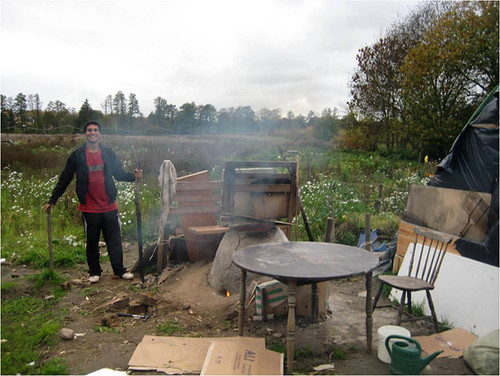
Right to farm the land
Cooperation between Plan3/Octava, Kultivator and Public globality gardens, with land from Råbelövs gods.
In Swedish language, the expression ”farm the land” can be read both as the right to actually farm, thus grow crops in the soil, and as the right to use, or make use, of the land meaning a country, or national state.
During the project ”Right to farm the land”, the three groups Octava/plan3, Kultivator and Public globality gardens cooperated with Råbelövs gods, a big landowner in the south of Sweden, who was willing to provide one hectar of farm land for artistic purposes. (For a large industrial farm as his, 10 000 m² laying like this piece isolated in a forest, is too small to work in a profitable way.)
Close to this piece of land lies a suburb of the city Kristianstad, called Gamlegården (=old farm) that is home to a large community of people that migrated from rural areas in Somalia and the south of Iraq quite recently.
In this suburb we set up an office in an abandoned bankoffice in a small shoppingmall, and started interviewing people asking whether they had farming experience and interest in using a piece of land for growing food. During one week, the message was informally spread that for those who wanted, Rights to farm the land would be granted for at least one year and maybe longer. No costs, but also no help or support was connected to the Rights. The choice to hand over Rights rather than ”this piece of land”, was to avoid creating merely a set of allotment gardens, and imply that the right to make use of it could also apply outside the conventional structures of ownership.
The Rights to farm the land where handed out in spring 2008, and around 40 groups, individuals and families started to grow food. In spite of little Challenges like drought, wild animals and somewhat suspicious neighbours were conquered by the group’s own resources, with little coordination or external support, During Spring 2009, the group – with many fall outs and many newcomers – transformed itself into a formal collective that shares responsibility for water harvesting and working tools.
[AFG_gallery id=’15’]

